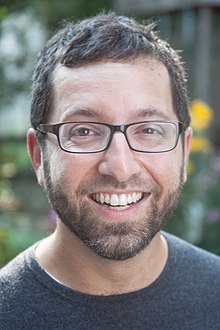Jordan S. Ellenberg
Jordan Stuart Ellenberg (* 1971 in Potomac (Maryland) ) is an American mathematician who studies arithmetic algebraic geometry and number theory.
Life
His father Jonas Ellenberg is a professor of biostatistics at the University of Pennsylvania and his mother Susan Ellenberg is also a statistician. Ellenberg grew up in Potomac and received two gold medals (1987, 1989) at the International Mathematical Olympiad and 1989 First Prize. He first studied creative writing for a year at Johns Hopkins University . He was Putnam Fellow twice and after completing his bachelor's degree in 1993 (summa cum laude), he received his doctorate from Harvard University under Barry Mazur in 1998 (Hilbert modular forms and the Galois representations associated to Hilbert-Blumenthal abelian varieties). He was then an instructor and from 2001 an assistant professor at Princeton University . In 2005 he became Assistant Professor, 2007 Associate Professor and 2011 Professor at the University of Wisconsin .
With Akshay Venkatesh he applied methods of ergodic theory to the question of the representation of integral quadratic forms by those with fewer variables and demonstrated the validity of a local-global principle (in the sense of Helmut Hasse ).
In 2010 he was invited speaker with Venkatesh at the International Congress of Mathematicians in Hyderabad ( Statistics of number fields and function fields ). In 2012 he became a Fellow of the American Mathematical Society . In 2016 he was awarded the Euler Book Prize for his book How Not to Be Wrong .
He published a popular science book on mathematics in everyday life, writes about mathematics for example in the Wall Street Journal , Washington Post , Wired and New York Times Book Review and has a blog (also about mathematics) Quomodocumque .
He is married to the psychologist Tanya Schlam and has two children. He published a novel (The Grasshopper King, Coffee House Press 2003).
Fonts
- Serre's conjecture over F 9 . In: Annals of Mathematics , 161, 2005, pp. 1111–1142
- with Venkatesh: The number of extensions of a number field with fixed degree and bounded discriminant , Annals of Mathematics, 163, 2006, pp. 723-741
- Arithmetic algebraic geometry and elliptic curves . In: Timothy Gowers et al. a .: The Princeton Companion to Mathematics . Princeton University Press, 2008
- How not to be wrong . Penguin, 2014
Web links
Individual evidence
- ↑ Local global principles for representations of quadratic forms . In: Inventiones Mathematicae , Volume 171, 2008, p. 257, arxiv : math / 0604232
| personal data | |
|---|---|
| SURNAME | Ellenberg, Jordan S. |
| ALTERNATIVE NAMES | Ellenberg, Jordan Stuart |
| BRIEF DESCRIPTION | American mathematician |
| DATE OF BIRTH | 1971 |
| PLACE OF BIRTH | Potomac, Maryland |
